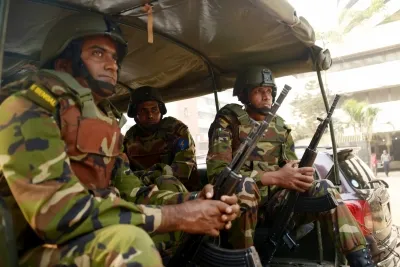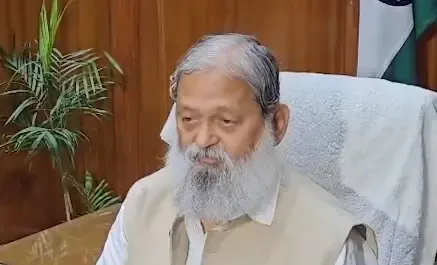Are Indian agencies monitoring the Bangladesh Army's growing ties with ISI-affiliated groups?

Synopsis
Key Takeaways
- Bangladesh Army has shifted allegiance to Jamaat-e-Islami.
- Growing ties with Pakistan raise security concerns for India.
- Military delegation from Pakistan signals strengthening relations.
- Internal divisions within the Bangladesh Army influence its current stance.
- Recent violent incidents against minorities highlight troubling trends.
New Delhi, Oct 6 (NationPress) The Bangladesh Army was once seen as the final beacon of hope for its citizens; however, it has now fallen fully under the influence of Jamaat-e-Islami. Just two months ago, the army had called for peace and successfully thwarted an attempt by Muhammad Yunus to incite conflict with India.
Initially, the Bangladesh Army demonstrated maturity in a highly charged atmosphere, but it has now become similar to its Pakistani counterparts. Officials indicate that the Indian armed forces are bracing for a completely transformed scenario along the Indo-Bangladesh border.
Under Sheikh Hasina's leadership, the Bangladesh Army maintained a distance from Pakistan, but now it appears to be drawing closer to Islamabad. Following the collapse of Hasina’s government, the ISI and Pakistan Army have intensified their presence in Bangladesh. ISI agents have made numerous visits, advising terrorist factions to expand their operations.
The ISI has extended tactical assistance to various terrorist groups targeting India, with operatives dispatched from Pakistan to train Bangladeshi recruits for potential attacks.
Instability in Bangladesh poses a direct threat to India, which had previously viewed the Bangladesh Army as a stabilizing force. In the wake of Sheikh Hasina’s removal, the army initially sought to restore peace amidst the chaos.
General Waker-Uz-Zaman, the Bangladesh Army Chief, had publicly declared his intolerance for violence against minority communities and resisted several government decisions influenced by Pakistan.
However, the army now seems to align with the Jamaat-backed Yunus administration. On September 29, this same army that once condemned violence against minorities opened fire on Hindus and Buddhists protesting against rape and temple assaults in Khagra Chhari.
Intelligence reports suggest that the shift in the Bangladesh Army's position was anticipated. Initially resistant to the Yunus government's policies, many within the army have now turned against their leaders.
An official explained that the leadership had little choice but to adjust their stance, given that a significant portion of the army is now influenced by the Jamaat, which is supported by the ISI. This has become a matter of survival for the top brass who previously articulated a clear perspective on the national situation.
A delegation from the Pakistan Army, led by Lieutenant General Tabassum Habib, is set to visit Bangladesh on Monday for discussions with senior officials of the Bangladesh Army, indicating a deepening military rapport between the two nations.
Additionally, Turkey is also actively working to solidify ties between Bangladesh and Pakistan, raising further concerns for India.
Although neither the Bangladesh nor Pakistan Army can match India's military strength, the growing relationship presents security challenges. Indian forces are prepared for any developments.
Despite the newfound camaraderie between the two armies being a source of concern, it is believed that Bangladesh will exercise caution before initiating any aggressive actions against India.
In light of these developments, there are indications that General Zaman may not attend the United Nations Troop Contributing Countries’ (UNTCC) Chiefs Conclave in New Delhi from October 14 to 16, opting instead to send a junior officer. This signifies a substantial alteration in the Bangladesh Army's previously strong ties with India.









